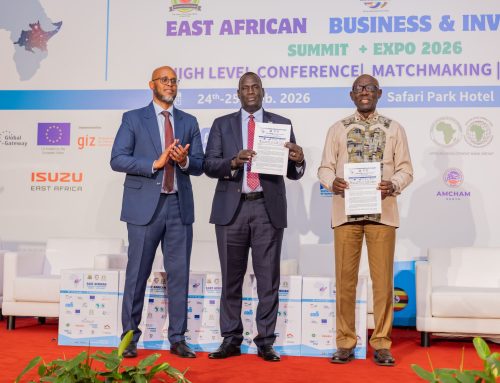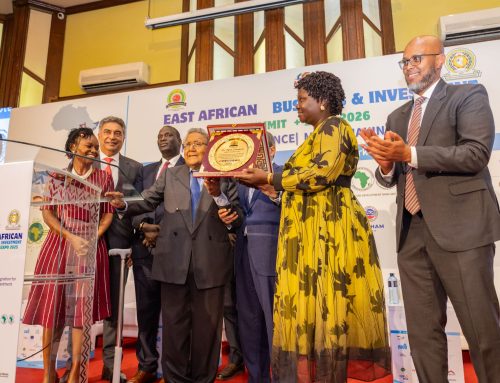Summary of the assignment:
| Nature of assignment | Short term |
| Location | Will vary depending on the respondents |
| Timeframe | 21 working days |
| Reporting | To Executive Director/CEO |
1.0 BACKGROUND TO THE EABC TRADEMARK EAST AFRICA PROJECT
The East African Business Council (EABC) is implementing the TMEA project titled Public‐Private Sector Dialogue (PPD) for Trade and Investment in Eastern Africa”. This regional project targets to mainstreaming advocacy throughout TMEA’s project clusters which are transport & logistics; customs & tax; standards & Sanitary Phyto Sanitary (SPS) Measures; African Free Trade Area (AfCFTA) & Tripartite Free Trade Area
(TFTA) and Non-Tariff Barriers (NTBs). The programme’s core objective is to enhance private sector organizations’ (PSO) capacity to proactively and positively influence decision‐making, to accelerate dispute resolution, to sustain political buy‐in, to increase commitment and to reduce overall programme risks in TMEA’s project clusters. This will increase trade and investment in the EAC. The Regional Programme will contribute to core TMEA corporate results outlined below:
- Reduce transport (road, rail, and air) cost and time along transport corridors by 10% and increase efficiency in private sector logistics services provision
- Enhance Customs and other trade‐related agencies efficiency (25% reduction in time to process trade documentation) through integrated trade management systems and greater inter‐agency collaboration.
- Reduced tariffs, taxes, and levies by 5‐8% overall (including sub‐national) reduce exemption regimes, CET, and increase import/export tax incentives
- Enhanced efficiency of Bureaux of Standards, reduce related costs and time by 10%, reduce counterfeit and sub-standard goods by 20% through enhanced inter‐agency collaboration and improve private sector compliance.
- Resolve 30% of all reported NTBs along TMEA project clusters within a year.
- Catalyzing a 10% increase in exports annually, 93,000 direct jobs and $425m additional investment after seven years in targeted sectors in the EAC under the Compact and TLCs through increased investment incentives.
| 2.0 | ABOUT EAST AFRICAN BUSINESS COUNCIL |
The East African Business Council (EABC) is the umbrella body of the Private Sector in the East African Community (EAC). It brings together national private sector umbrella bodies, manufacturers, employers, bankers, insurance and transporters associations, chambers of commerce, corporates, and medium and small enterprises from the entire East African region.
EABC’s mandate is to represent and promote the interests of the EAC business community, provide value-added services that enhance trade and competitiveness, and to participate actively and positively influence legal and regulatory formulation to improve the business environment. EABC works with the major stakeholders such as the EAC Secretariat, Organs, Institutions and National Governments and provides input in policy discussion while advocating for the implementation of resolutions at the national level aimed at increasing intra-regional trade. For effective implementation of the Regional PPD programme, EABC was selected by TMEA as the lead implementing partner for the Private Sector Organizations.
| 3.0 | RATIONALE AND OBJECTIVE OF THE ASSIGNMENT |
Treaty for the Establishment of the East African Community (EAC) provides that the overall objectives in the agricultural sector are the achievement of food security and rational agricultural production with the Community. To achieve these objectives, the EAC Partner States have adopted the Agriculture and Rural Development Strategy which outlines the strategic interventions identified for the acceleration of agricultural sector development. The six interventions are: improving food security, accelerating irrigation development, strengthening early warning systems, strengthening research, extension and training, increasing intra and inter-regional trade and commerce and physical infrastructure and utilities.
In the EAC region, agriculture is considered as the backbone of most of EAC Partner States and plays a key role in their industrial development. Agriculture accounts for more than 32 percent of the region’s Gross Domestic Product (GDP), employs about 80 percent of its labour force, accounts for about 65 percent of foreign exchange earnings and contributes more than 50 percent of raw materials to the industrial sector. Despite the importance of the sector in the EAC economies still, the agricultural sector faces numerous challenges preventing it from achieving the desired objectives of food security and rational agricultural production with the Community. Some of the challenges are declining agricultural yields, drought, ecosystem degradation, floods and locusts. These challenges are exacerbated by the fact that over 95% of agriculture in the region is rainfed.
The outbreak of COVID-19 pandemic has far reach impact on the agricultural sector in the EAC region. Due to the disruption of the global supply chain and restrictions put by EAC Partner States to contain the spread of COVID-19 there is likely that the agricultural sector will negatively be impacted. The existing and potential impact of COVID-19 pandemic includes disruption of food supply, production, farm inputs, price fluctuations, restrictions of import and exports as well as shortages of labour supply. The region has already felt the impact of COVID-19 pandemic in the horticultural sub-sector as flowers, fruits and vegetables are finding it very difficult to access international markets due to travel and import restrictions.
Aiming at having a clear understanding of the impact of the COVID-19 on agriculture, the EABC Secretariat through TMEA Regional PPD programme is commissioning a consultancy whose main objective is to assess the impact of COVID-19 pandemic on agriculture in the EAC and develop a post-COVID-19 recovery strategy for the sector.
| 4.0 | SCOPE OF THE WORK AND DUTIES |
In order to achieve the desired objectives of the consultancy, the technical proposal should detail how consultancy will be conducted. The technical proposal should also contain a work plan which explains how the assignment will be undertaken in line with the timeframe. Finally, the technical proposal will include a methodology that meets both the scope of work and deliverables described in the Terms of Reference (ToR). The main activities of the Consultant are not limited to:
- Assessment of the impact of COVID-19 pandemic on the agricultural sector in the EAC (with specific emphasis on value chain analysis);
- Development of post-COVID-19 recovery recommendations for the agricultural sector in the EAC;
- Develop EABC Policy brief on the impact of COVID-19 pandemic on agriculture and post-COVID recovery recommendations for the sector;
- Organize internal validation workshop; and
- Present a report of the impact assessment of the COVID 19 and post-COVID recovery recommendations for the Agricultural sector in the EAC
| 5.0 | DELIVERABLES |
The key deliverables include:
- Inception report which among other things will contain the detailed work plan for carrying out the scope of work, proposed methodology and research design survey instruments
- Draft report of An Impact Assessment of COVID-19 pandemic on agriculture in the EAC and Post COVID-19 recovery recommendations for the sector
- Final report that includes, final findings An Impact Assessment of COVID-19 pandemic on agriculture in the EAC and Post COVID-19 Recovery recommendations for the sector. The report will cover the Consultant’s final findings, after feedback from EABC Secretariat and other key stakeholders
- Policy brief which will contain a summary of both findings of an impact assessment of COVID-19 pandemic on agriculture and post COVID-19 recovery recommendations for agriculture in the EAC.
| 6.0 | QUALIFICATIONS AND EXPERIENCE |
A suitable candidate should hold the following qualifications and key competencies:
- Academic qualifications: A Master’s degree or postgraduate qualification in any of the following fields, Agricultural Economics, Economics, Business Administration, or any other relevant field is required.
- Work Experience: A minimum of ten (10) years’ demonstrable experience in conducting research /survey on the agriculture-related field, an understanding of agriculture commodity trade across EAC region
- Proven track-record in related assignments
- Communication and Networking: Must be able to identify key stakeholders; seek their views, correctly interpret their messages and respond appropriately
- Knowledge of EAC Integration, international trade and EAC agricultural sector is a must
- Languages: Fluency in oral and written English is required as it is the main EAC working language. Good working knowledge of French and Kiswahili will be an advantage.
- Additional Skills: Excellent computer skills (Microsoft Office (Word, PowerPoint, and Excel), Email, analytical tools/software for data analysis, experience in working with internet searches, online databases, and data retrieval) are required.
- Nationality: The position is only open to Nationals of any of the EAC Partner States, Burundi, Kenya, Rwanda, Tanzania, Uganda and South Sudan.
| 7.0 | THE APPLICATION PROCESS |
The technical and financial proposal must be submitted separately addressed to;
The Executive Director / CEO
East African Business Council (EABC)
Ninth Floor, Mafao House, Old Moshi Road
P. O. Box 2617
Arusha, Tanzania.
Email: director@eabc-online.com with a copy to procurement@eabc-online.com clearly marked “Consultancy to Undertake an Impact Assessment of COVID-19 Pandemic on Agriculture in EAC”. The proposal should include current curriculum vitae, proposed methodology, work plan and a financial proposal.
The financial proposal should be protected with a password.
Applications close on (20th February 2021) at (5.00 p.m.)
EABC is an equal opportunity employer thus recruitment is on merit and with no regard to one’s age, colour, gender, marital status, disability or impairment, race or creed. Canvassing shall lead to automatic disqualification.
Environmental aspects will be taken into consideration.




